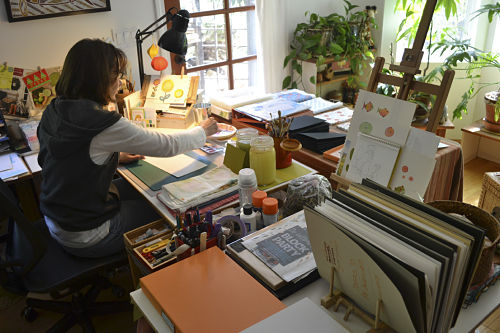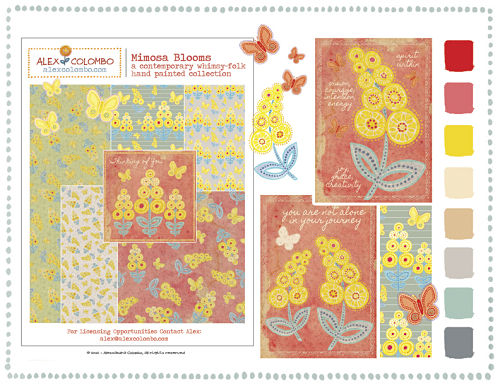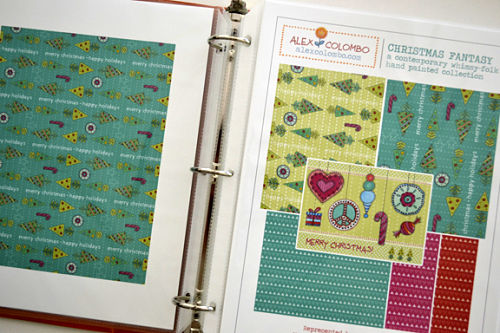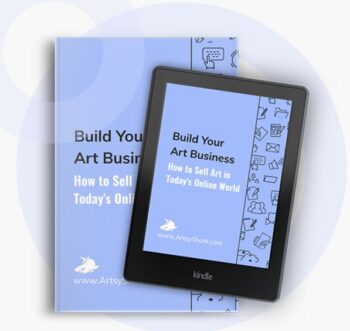by Carolyn Edlund
An interview with artist Alex Colombo, who shares her thoughts on licensing art and the learning process.
AS: What are some beginning concepts you think are important to know for artists who are considering licensing?
AC: It has to do with having a purpose. What’s your purpose? Why are you entering this field? Licensing is a way to achieve a purpose. It’s best to have a clearly defined one before and during your work. With that in mind, the rest follows, because following your passion becomes easier if you have a clear purpose. Write it down, tweak it, make it your own and intensely go for it!
My approach to any professional design project or business is to find out what’s going in the field. I am a visual person so I look at as many images as possible that are interesting to me. I also love to read up about subject matters that I see fit my learning challenge. Knowledge is power. Books, blog articles and forum discussions.
Allow yourself to experiment a little, based on what you are learning. Keep an open, curious mind, adjust your views as you go, but keep focused on what you feel is best for you. Licensing is fun, or should be, but it can also be very confusing at times. So many different paths and views… that’s why having a finite purpose will help you through and keep you on track.
I host blog interviews of licensing artists. Read some of their stories and you’ll learn so much more about categories of licensing, styles, products and what they went through. Very inspiring indeed – it makes you feel part of a huge, wonderful community.
A third but not less important principle is that no one knows who you are if you don’t get yourself out there. Get connected to the right forums and groups with whom you can exchange precious info regarding your new activity. And while at it, don’t forget to establish a proper business etiquette if you don’t already have one. People are nice and willing to share and help; respect them, their experience, their views. Allow them to be and they will allow you to be, too.
Finally, your presentation of yourself and your artwork is important. In my view, 50% of the gains are through proper presentation. I say proper because it’s all relative to the context you are presenting something in. Even the most beautiful design can appear ugly if placed in the wrong context or situation. So be aware of the fundamentals of art and design. If you don’t know them you might want to read up on things like the color wheel, the Golden Ratio, etc. Figure out what you want to say and say it the best way you can.
AS: What lessons have you learned from licensing your work?
AC: One big lesson for me was to fully shape my own purpose. I want to have my art on products, so I need to create art that fits those products, right? For what purpose though, that’s the key question. Money is of course part of the business, you can’t live without, but money is not the answer – at least for me. Licensing doesn’t give you an immediate monetary reward. And it’s not a real purpose, because money is simply a commodity.
My purpose originally was: Making the World a Better Place through Art, which I recently redefined as: Partnering to Make the World a Better Place through Art. Because in licensing you work as a team. It’s you and the manufacturers, the retailers, and the consumers. You create the art, they make, sell, or buy the products. It’s a dedicated and honest partnership.
AS: What are your thoughts on the pros and cons of working with agents?
AC: Again, it comes down to what your purpose is. Do you like the adventure of tackling something new and foreign yourself, learning all you can about all the angles and nuances, and in the process help define and refine your goals? Do you want to have a choice of what products and manufacturers are best for your art? Or do you want to focus on making art and let someone else deal with all the rest of the dynamics, including marketing and promotion, handling contracts, choices of products, and creating business partnerships?
With some agents you don’t get to drive all aspects; they do most if not all of the business side of the field. With other agents you have a partnership, you can be their co-pilot. Yet, you don’t get to drive, they do. They have to make decisions on what’s best, for themselves, their pool of artists, their manufacturers; you are one of the many responsibilities they have.
You will find along the way many other artists who have gone down your same road and they will offer assistance to you, they will give you a hand.




Totally agree with your focus on clarifying your purpose and how everything will flow better from that. Thanks for the interview!
i NEED SOME HELP. i AM A FINE ARTIST AND HAVE MANY YEARS OF PAINTING ETC., AND i DONT LIKE THE DESIGNS THAT I SEE ANYWHERE THAT IS CALLED LICENSED ART, I E THE CARTOONY FLAT QUALITY. aRE THERE LICENSED DESIGNS THAT ARE NOT LIKE THAT? PLEASE ADVISE THANK YOU.
ARA
Ara, there are all types of art that is licensed. Visit the website for the Surtex licensing trade show and see the list of exhibitors here http://www.surtex.com/TheShow/ExhibitingCompanies/tabid/59/Default.aspx. Then visit the websites of these artists. You will see quite a variety of images.